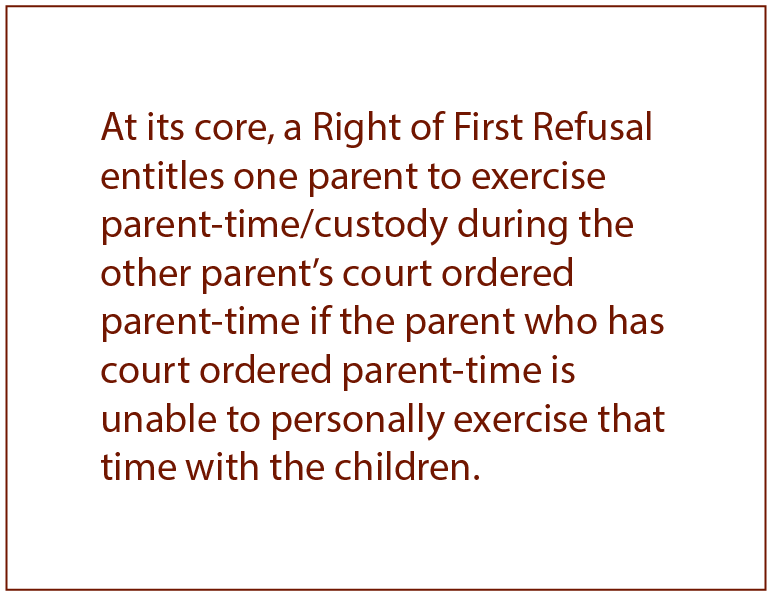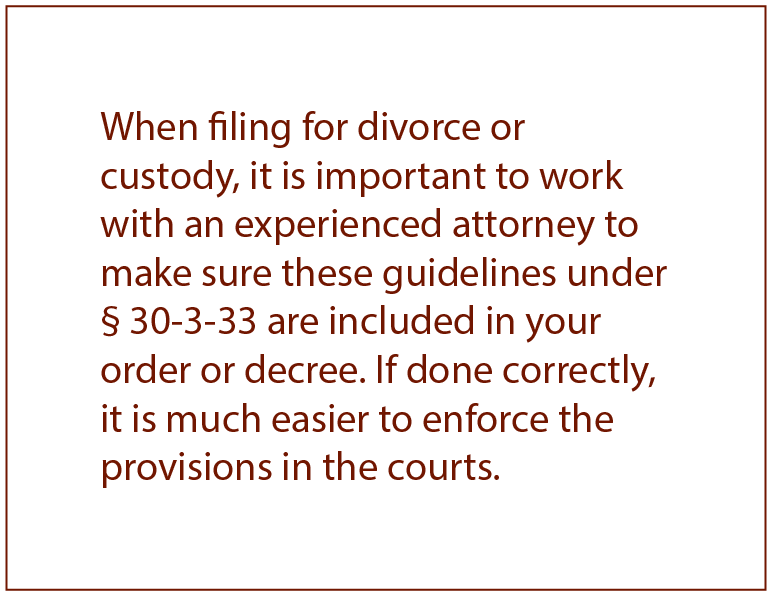UTAH CODE 30-3-33
Utah Code § 30-3-33 |Utah Custody Guidelines
One of the most important things to know in Utah divorce and custody cases is what guidelines judges usually follow when entering child custody and parent-time orders. Those guidelines are found in Utah Code § 30-3-33. Although Utah Appellate Courts have held that these advisory guidelines are just that – advisory – they are still frequently incorporated in some way into divorce decrees and other court orders related to child custody and parent-time. (Further explained in the case Wight v. Wight.)
If there is already an order in your case, you should review it carefully to determine if the provisions of § 30-3-33 are incorporated into it or not. If you are seeking to modify or create a new order related to child custody or parent-time, then you should make sure your attorney is familiar with the specifics of § 30-3-33 and how the court will likely enforce those provisions. Even if the provisions contained in § 30-3-33 are not specifically mentioned in your order or decree, Utah commissioners and judges will often utilize them when revising an order or modifying a decree.
Some of the advisory guidelines are fairly obvious such as parent-time schedules mutually agreed upon by both parents being preferable to a court-imposed solution (§ 30-3-33(1)]) and that the parent-time schedule shall be used to maximize continuity and stability in the child’s life (§ 30-3-33(2)). Others provisions make sense with a little thought, such as a preference to have the parent-time schedules for multiple children be the same (§ 30-3-33(18)).
When conflicts arise regarding the § 30-3-33 advisory guidelines, it is usually in one of the following areas:
Right of First Refusal
Many custody and parent-time orders and decrees of divorce will include what family law attorneys refer to as the Right of First Refusal (sometimes also referred to as First Right of Refusal or Parental Preference Provision). At its core, a Right of First Refusal entitles one parent to exercise parent-time/custody during the other parent’s court ordered parent-time if the parent who has court ordered parent-time is unable to personally exercise that time with the children. For example, if Mom is entitled to have the children with her this upcoming week, but she will be out of town on business that week, then she would be required to offer that parent-time to Dad. Dad would then be entitled to have parent-time that week with the children if he was willing and able to do so.
The justification for the Right of First Refusal is contained in advisory guideline § 30-3-33(15) which says, “parental care shall be presumed to be better care for the child than surrogate care and the court shall encourage the parties to cooperate in allowing the noncustodial parent, if willing and able to transport the children, to provide the child care.” However, a Right of First Refusal is not appropriate in all cases, such as when there is domestic abuse or high conflict between the parents, and it is not a given that a court will order a Right of First refusal. If there isn’t a specific provision ordering a Right of First Refusal in your custody and parent-time order, then one most likely one does not exist in your case. Simply incorporating Utah Code § 30-3-33 into an order or decree is, on its own, probably not sufficient to create a Right of First Refusal.


Withholding Parent-time Because the Other Parent Isn’t Paying Child Support (or Withholding Child Support Because the Other Parent Isn’t Permitting Parent-Time)
Utah Code § 30-3-33(10) provides that “[n]either parent-time nor child support is to be withheld due to either parent’s failure to comply with a court-ordered parent-time schedule.” This particular advisory guideline states the general rule under Utah law that one parent’s failure to comply with a court order does not justify the other parent’s noncompliance with the court order. If one parent is withholding parent-time or child support in violation of a court order, then the proper way to remedy the situation is by bringing the issue before the court on an Order to Show Cause and not through one parent enforcing it on their own—that can cause legal problems for both sides.
In other words, if Dad is required to pay child support to Mom and refuses (or simply fails) to do so, Mom is not entitled to withhold his access to their children. Also, if Mom is wrongfully withholding Dad’s access to their children or otherwise violating his court ordered parent-time, Dad must still continue to pay Mom child support. The proper way to hold the other parent accountable for either the denial of parent-time or failure to pay child support is through filing an Order to Show Cause, and not by further violating the court’s order, which potentially exposes that parent to contempt sanctions.
Communication Between Parents, Between Parents and Children, and Between Parent’s and Third-Parties
The advisory guidelines contain various provisions related to the communication between parents, parents and children, and parents and third parties. For example, they require a custodial parent to notify the other parent within twenty-four (24) hours of receiving notice of significant activities involving the child [§ 30-3-33(11)]; each parent to update the other with contact information within twenty-four (24) hours of a change [§ 30-3-33(12)]; each parent to provide surrogate care providers such as babysitters with the other parent’s contact information [§ 30-3-33(16)], and each parent to permit and encourage virtual parent-time (e.g. Skype, telephone calls, etc.) between the children and the other parent during reasonable hours [§ 30-3-33(14)].
When filing for divorce or custody, it is important to work with an experienced attorney to make sure these guidelines under § 30-3-33 are included in your order or decree. If done correctly, it is much easier to enforce the provisions in the courts. If done incorrectly, it is very difficult to hold the other parent accountable. A simple statement in the order that “the parties should comply with the terms of Utah Code § 30-3-33” could be found insufficient to hold a parent in contempt if he or she violates these provisions. An experienced family law attorney can help draft language in an order to ensure the other parent won’t be able to violate these provisions without recourse.


Family Functions and Major Religious Holidays
Utah Code § 30-3-33(17) can lead to a great deal of confusion among parents. It provides that “[e]ach parent shall be entitled to an equal division of major religious holidays celebrated by the parents, and the parent who celebrates a religious holiday that the other parent does not celebrate shall have the right to be together with the child on the religious holiday.” Based on that language it sounds as though, if one parent does not generally celebrate Christmas, for instance, then the other parent should be entitled to have the children for Christmas every year. While that might seem reasonable, it is likely incorrect.
First, this provision often clashes with the holiday parent-time schedule ordered by the Court in the case [see, for example, Utah Code § 30-3-35(2)(f)(viii), 30-3-35(2)(g)(viii), and 30-3-35.1(6)(c)]. Second, as discussed above, exactly how the § 30-3-33 advisory guidelines are incorporated into your order impacts how enforceable they are through an Order to Show Cause or contempt action. If this provision does conflict with the regular parent-time schedule, then enforcement through a contempt action is likely to be very difficult if not impossible.
Similarly, Utah Code § 30-3-33(3) provides that “[s]pecial consideration shall be given by each parent to make the child available to attend family functions including funerals, weddings, family reunions, religious holidays, important ceremonies, and other significant events in the life of the child or in the life of either parent which may inadvertently conflict with the parent-time schedule.” While this provision is usually more enforceable than § 30-3-33(17), exactly how it is incorporated into your order or decree will often determine whether or not a court will force a parent to comply with it.
As you can see, although the guidelines are helpful to consider when determining what should be included in your divorce or custody case, the way courts handle them is not as straightforward as it seems. Our attorneys are very good at making sure things are done right so that you can avoid many disagreements and problems in the future. Contact our Utah family law attorneys today.
You might also be interested in: Common Utah Family Law Statutes







